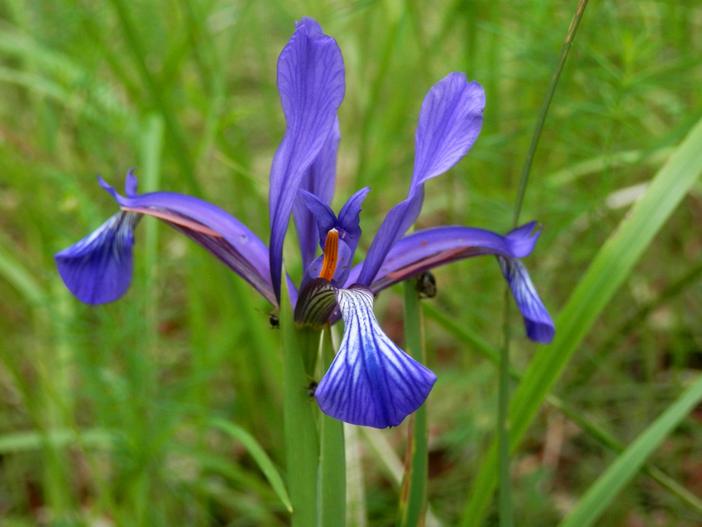Spuria Iris
(Iris sintenisii)
Spuria Iris (Iris sintenisii)
/
/

ABesheva
CC BY-SA 4.0
Image By:
ABesheva
Recorded By:
Copyright:
CC BY-SA 4.0
Copyright Notice:
Photo by: ABesheva | License Type: CC BY-SA 4.0 | License URL: https://creativecommons.org/licenses/by-sa/4.0 | Uploader: ABesheva | Publisher: Wikipedia Commons






















Estimated Native Range
Summary
Iris sintenisii, commonly known as Spuria Iris, is a rhizomatous perennial herb native to rocky slopes and grasslands in southeastern Europe. It features tall, thin stems, violet-blue flowers, and long, grass-like leaves. The plant typically grows to a height of 0.4-1 feet (12-30 cm) and a width of 0.3-0.7 feet (9-21 cm). Over time, it forms dense clumps or tussocks, which can be quite striking in a garden setting. The flowers of Iris sintenisii are particularly showy during their bloom period in late spring to early summer.
Spuria Iris is valued for its ability to create tight, grassy clumps that add texture to garden designs. It is also appreciated for its drought tolerance once established, making it suitable for xeriscaping. The plant’s violet-blue flowers provide a splash of color and are attractive to pollinators. Common uses in cultivation include rock gardens, front-of-border placements, and trough or sink gardens. Iris sintenisii thrives in full sun to partial shade and requires well-drained soils that retain moisture during the growing season without becoming waterlogged. It is tolerant of limestone-rich soils and prefers neutral to alkaline pH levels. While it needs ample moisture to bloom, over-watering should be avoided. Care should be taken when weeding, as the foliage can be mistaken for grass. Propagation is typically done by division or seed. Potential problems include root rot if the soil is too wet and leaf spot diseases.CC BY-SA 4.0
Spuria Iris is valued for its ability to create tight, grassy clumps that add texture to garden designs. It is also appreciated for its drought tolerance once established, making it suitable for xeriscaping. The plant’s violet-blue flowers provide a splash of color and are attractive to pollinators. Common uses in cultivation include rock gardens, front-of-border placements, and trough or sink gardens. Iris sintenisii thrives in full sun to partial shade and requires well-drained soils that retain moisture during the growing season without becoming waterlogged. It is tolerant of limestone-rich soils and prefers neutral to alkaline pH levels. While it needs ample moisture to bloom, over-watering should be avoided. Care should be taken when weeding, as the foliage can be mistaken for grass. Propagation is typically done by division or seed. Potential problems include root rot if the soil is too wet and leaf spot diseases.CC BY-SA 4.0
Plant Description
- Plant Type: Bulb
- Height: 0.4-1 feet
- Width: 0.3-0.7 feet
- Growth Rate: Moderate
- Flower Color: Purple, Blue
- Flowering Season: Spring, Summer
- Leaf Retention: Evergreen
Growth Requirements
- Sun: Full Sun, Part Shade
- Water: Medium
- Drainage: Medium, Fast
Common Uses
Bee Garden, Bird Garden, Butterfly Garden, Deer Resistant, Fragrant, Hummingbird Garden, Low Maintenance, Rabbit Resistant, Rock Garden, Salt Tolerant, Showy Flowers
Natural Habitat
Rocky slopes and grasslands in southeastern Europe
Other Names
Common Names:
Scientific Names: , Iris sintenisii, Chamaeiris sintenisii, Iris graminea subsp. sintenisii, Iris graminea var. sintenisii, Xyridion sintenisii,
GBIF Accepted Name: Iris sintenisii Janka